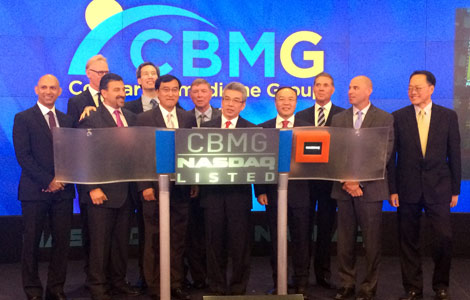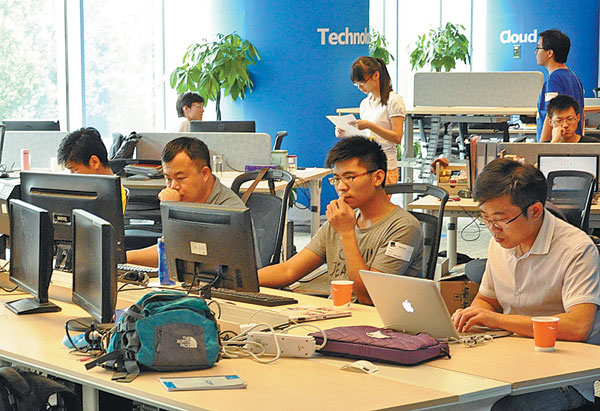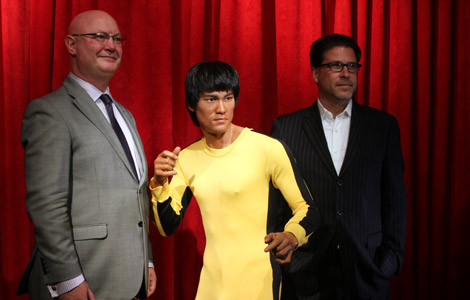Startups enter exciting new age
Updated: 2014-08-20 07:11
By Zheng Jinran(China Daily USA)
|
|||||||||
Tech companies find it easier to attract money and support
The entrepreneurial age is here, with easy access to big data and investors for capital assistance, said Lee Kai-Fu, Google Greater China's former CEO and the president of Innovation Works.
"The cost of startups in China has never been so low," Lee said during a major conference in August.
|
Young people involved in startups work with the aid of the Microsoft Ventures Accelerator incubation program in Zhongguancun, Beijing. Provided to China Daily |
As if to prove his point, China's iconic technology park in Zhongguancun, Beijing, sees more than 4,000 startups annually.
The improving service from these incubation programs in specialized zones, working in close partnership with multinational groups, has been a major factor in ushering in the age of entrepreneurs, Lee said.
Launched in the early 1990s as China's first national high-tech industrial zone, Zhongguancun, or Haidian Science Park, has become a key incubator of high-tech companies and has also attracted many global technology firms, including more than 40 research and development centers from the top 500 global companies.
Innovation Works, which Lee founded in September 2009, is one of them. Since its launch, the company has developed into one of the largest incubators in China, helping entrepreneurs start up companies in mobile computing, e-commerce, and cloud computing, to name just a few.
Global giants like Microsoft also have an active presence in Zhongguancun.
Li Guanzhi, the owner of Beijing-based Sulai24, a website allowing labor-intensive industries to recruit high-quality workers, was one of the many wannabe entrepreneurs who attended the Microsoft Ventures Accelerator program, hoping to expand his team into a successful headhunting outfit.
"The opportunity and working environment have been crucial to the future of the project," he said, "The support from the accelerators did help us a lot, turning a small team into a company with about 30 employees."
Under the Microsoft Ventures Accelerator, the technology giant has striven to get startups going within six months through technological support, training, market and user matchups, talent recruitment and financing assistance.
Attracted by the brand power of Microsoft and his goal, Li managed to recruit top-class expertise, and the website has helped more than 10,000 workers get responsible high-tech positions.
The technology giant does not require any payback from the startups, but wants to find possible long-term partners for them.
The companies that started up could eventually be partners of Microsoft or working with clients of Microsoft. For example, AllMobilize, a company in automatic website adaptation, has provided services for many enterprises, even developing clients of Microsoft into theirs, such as Lenovo.
Over the past two years, about 66 startups in China have received multiple training sessions from the accelerator classes and an average of about 1 million yuan ($163,000) to 1.5 million yuan each in resources. In addition, 90 percent of them have obtained funds from investors to promote further growth.
The program has accelerated 205 startups worldwide in Bangalore, Beijing, Berlin, London, Paris, Seattle and Tel Aviv since it started in 2012.
"Compared with other markets, the business environment for startups is much better in Beijing, because of the large domestic market, supportive government policies, growing expertise and other sectors such as the capital market," said Gao Xinxin, CEO in Residence of Microsoft Ventures Accelerator Greater China.
Zhou Xigang, a deputy manager from Beijing Zhongguancun International Incubation Inc, said their approach is different from traditional incubation companies.
"We shoulder the responsibility that often falls on governments by focusing on implementing preferential policies to support the startups as well as providing services to help them finish procedures required by the governments," he said.
There is competition among the incubation programs, but cooperation is the main trend, he said.
There are more than 1,200 companies providing incubation services in China, of which 435 operated at a national level in 2013, said a report from Torch High Technology Industry Development Center under the Ministry of Science and Technology.
But they are spread out in many cities, with various levels of service and the overall quality needs to be improved, the report said.
"It's necessary to regulate the rapidly expanding industry of business incubation to better serve the startups," said Chen Qing, head in charge of incubation programs for the center.
Based on the evaluation systems released by the ministry, all business incubation programs will be classified into four levels, and any program that fails to pass the evaluation procedure for two consecutive years, will be ruled out.
zhengjinran@chinadaily.com.cn
(China Daily USA 08/20/2014 page9)

 Former Microsoft CEO Steve Ballmer leaves board
Former Microsoft CEO Steve Ballmer leaves board
 Top 10 most attractive Chinese cities at night
Top 10 most attractive Chinese cities at night
 Performances to celebrate Chinese Opera Legend
Performances to celebrate Chinese Opera Legend
 Missouri governor lifts Ferguson curfew
Missouri governor lifts Ferguson curfew
 Rebuilding lives
Rebuilding lives
 US dominates Chinese world university rankings
US dominates Chinese world university rankings
 Residents caught giant alligator in Alabama
Residents caught giant alligator in Alabama
 Chinese biotech company rings closing bell at NASDAQ
Chinese biotech company rings closing bell at NASDAQ
Most Viewed
Editor's Picks

|

|

|

|

|

|
Today's Top News
Antitrust probes 'won't deter investors'
Obama vows long-term strategy against ISIL
Ministry says trade growth needs help to reach 7.5%
Xi pledges to make China media more up to date
Missouri gov lifts Ferguson curfew
US police uses China's social media
China's US debt holdings dip lower, again
Anti-trust team lacks real muscle for enforcement
US Weekly

|

|








